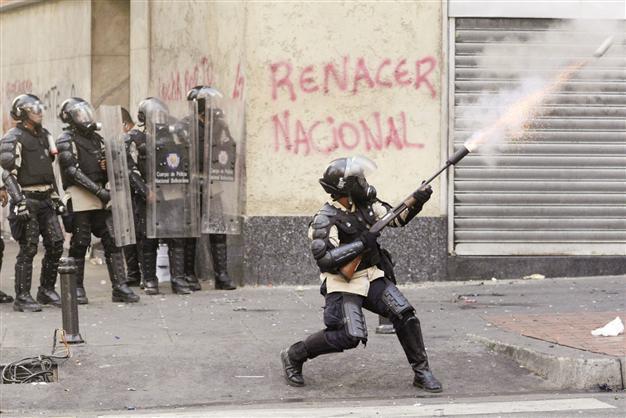Venezuela wants US to join 'peace commission' to end unrest
CARACAS - Agence France-Presse

Riot police clash with students as they protest against President Nicolas Maduro in Caracas next to a graffiti reading ‘National Rebirth.’ AFP photo
Venezuelan President Nicolas Maduro urged Washington on Saturday to join a "high-level commission" to promote peace after more than a month of deadly anti-government demonstrations.Maduro blames the United States for the riots, a charge US officials on Friday dismissed as "absurd."
At least 28 people have been killed and 400 injured in the student-led protests that began February 4 in western Venezuela and spread to Caracas and other cities.
Oil-rich Venezuela has seen almost daily anti-government demos as tens of thousands of people vent their rage over the soaring crime rate, spiraling inflation, and a lack of household goods in the markets.
Maduro, speaking at a rally in support of the armed forces, said he would propose a commission "for peace and mutual respect of sovereignty" between Venezuela and the United States that could include parties from both sides and the UNASUR grouping of South American nations.
The leftist president said he would name Diosdado Cabello, the head of Venezuela's National Assembly, to lead potential talks with the United States "to speak while respecting peace for a dialogue among equals."
His terms for dialogue are virtually identical to those that have been stated repeatedly by Cuba, Caracas's closest ally.
The United States has not taken either country up on their regularly stated offers.
Venezuelan Foreign Minister Elias Jaua had earlier called top US diplomat John Kerry a "murderer of the Venezuelan people," accusing him of encouraging the protests that have killed 28 people in five weeks.
"The solution to Venezuela's problems lies in democratic dialogue among Venezuelans, not in repression or in hurling verbal brickbats at the United States," a State Department official said Friday, speaking on condition of anonymity.
The United States is the main market for Venezuela's petroleum. The two countries have had testy relations for years, and withdrew ambassadors in 2010.
In his speech, Maduro also warned radical protesters at Caracas's Plaza Altamira, where they have been concentrating, that he was ready to crack down hard.
"I am going to give these 'Chuckies' who are taking over (the plaza) and blocking Francisco de Miranda Avenue two hours and if they are not out, I will be liberating these public spaces with public forces," he said.
Maduro calls the radical protestors "Chuckies," a reference to the murdering knife-wielding doll in the horror movie series.
Maduro also reiterated his desire to meet student demonstrators "with love." In the Chacao neighborhood, university students, many of them hooded, hurled rocks and Molotov cocktails, pulled up manhole covers, and built makeshift barricades with debris as they battled riot police.
Police fired tear gas into the crowd and sent in riot vehicles to clear the usually busy areas, sending the demonstrators scurrying.
Earlier, crowds supporting the Maduro government, including members of the armed forces, some in uniform, rallied in the Venezuelan capital.
"The people and the armed forces are on the streets defending the Bolivarian revolution and the legacy of Hugo Chavez, the country and our constitution," thundered Diosdado Cabello, sporting a coat in Venezuela's national colors of yellow, blue and red.
Many of the pro-government supporters held up Venezuelan flags and wore red, the color closely associated with the late leftist icon Hugo Chavez and his "Bolivarian revolution."
The Popular Will, a prominent opposition party, was set to hold a rival demo in another part of the capital, "to repudiate the brutal onslaught of state security and pro-government (vigilante) groups against demonstrators."
However the march was called off due to the "threat from violent groups" that support the government, said Popular Will spokesman Johan Merchan.
















